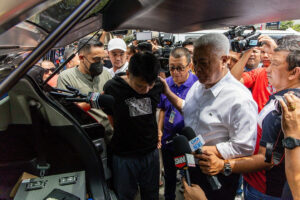Senatorial race: Perceptions of Metro Manila informal sector workers

By Maria Catalina M. Tolentino
WHAT do the Informal Sector (IS) workers think about the forthcoming senatorial race? Why did we choose them for the study? Because they comprise approximately half of the Philippine workforce. In the voting population, they comprise the majority of the electorate. Moreover, these workers can wait in long queues at voting precincts notwithstanding the heat and extended voting hours. It is difficult to give accurate numbers because many are in the underground economy, meaning they are not reflected in official accounts.
The International Labour Organization Philippine Office describes Informal Sector workers as the non-regularly employed, those who do seasonal or piece-rate jobs, for example carpentry, appliance repair, gardening, plumbing, and house cleaning. They often receive less than the mandated daily minimum wage rate or are paid at a negotiated price. “Kayo nang bahala” (It’s up to you), they answer when clients ask about their fees. Included in this category are what the Philippine Statistics Authority terms as self-employed — the market vendors, sari-sari (sundry) store operators, home-based food caterers, street hawkers, tricycle drivers, and independent contractors like the delivery riders or virtual assistants. In rural areas, we can include the farmers, fishermen and similar types. They cannot speak of benefits like social security, tenured work, health insurance. As to educational attainment, most are high school graduates, a few reached college levels.
In the months of January to March this year, my two classes in Research Methods conducted interviews among Informal Sector workers in a few cities in Metro Manila. We chose interviews and observations as data-gathering methods to delve deeper into the perceptions of voters about the senatorial election and the reasons why voters choose certain candidates. The students collected responses from a total of 105 workers aged 18 and above. Interviews and observations (unlike surveys) take longer to conduct and to process, even with a small sample size.
Approached for the interviews, many expressed bemused reactions such as: “Kelan ba ang election? Boboto ba tayo ng presidente? Matagal pa naman ’yan,” (When is the election? Will we vote for the president? That’s a long time away) or “Hindi ako boboto, wala namang mangyayari kahit sinong manalo.” (I will not vote, no change will happen anyway no matter who wins).
Do they know the job of a senator? Their reactions varied: silence or reluctance to respond but we were glad to hear one answer from a balut vendor: “Gumagawa ng batas” (They make laws), accompanied with laughter. What laws does he remember were authored by his senatorial bet? More laughter: “Hindi ko alam!” (I don’t know).
When asked whom they will vote for the senate, none of them gave quick answers and returned with perplexed look “Sino ba ang tumatakbo?” (Who are running?) particularly in interviews done in January to February. One interviewee shot back “Personal na ’yan. Tanungin mo na lang ako ng iba, huwag na ’yan” (That’s personal. Ask me another question, not about that) and turned away.
The team intentionally did not provide a list nor mention any candidates’ names. We wanted to see natural reactions and hear names that were really in their minds. Pressed for answers, some names were mentioned but interviewees did not give a complete list of 12. Several times only three were given or an average of seven, in an effort to recall more candidates. Asked to explain their choices:
“Kasi kilala na, dati nang nakaupo,” (They are known, they were already in the senate) validating the name recall factor.
“Tumutulong sa mahihirap, pag may baha namimigay,” (They help the poor, during floods they distribute goods) explaining their notions about help for the poor being tangible concrete efforts even from politicians who should be writing and explaining laws.
A 3rd grade schooled taxi driver mentioned a name and when asked to explain his choice: “Wala lang” (No reason) he said with a sheepish smile, and when grilled further said, “Sabi dun sa amin, sabi ng nanay ko.” (I heard from my neighbors and my mother).
Their sources of information are social media, particularly TikTok, especially when they are bored at work, like the drivers waiting for passengers.
On the issue of political dynasties, most are not aware that a sibling is still sitting as senator and will be joined by other siblings. They only remember the family name, as if referring to just one person or is running for reelection.
A pleasant surprise was about the ayuda (assistance). They accept ayuda but it is not the deciding factor. With or without ayuda, they will vote for whom they want.
Vague ideas about the elections are further reflected in the answers about mentioning candidates who are not running; other names may be running but not as senators.
There were respondents who regretted choosing candidates who did not meet their expectations; who did not help improve the quality of their lives, including the celebrity senators of past elections.
We attempted to approach agency-hired employees at the malls — the security guards, cashiers, salesclerks, food servers, merchandisers, toilet cleaners, and porters. These are contractual employees who are often stuck in minimum wage level jobs, but they refused to accommodate interviewers because supervisors were roaming the premises, looking over their shoulders. Despite being lowly paid, these employees were attentive to their tasks and were evasive about interviews. The topic being political could be another reason. It’s a sensitive topic to them thinking they might be castigated for mentioning controversial candidates.
It is observable that many Informal Sector workers have no clear ideas about the senatorial election. Yet despite the reluctance to vote, and the dissatisfaction about outcomes of past elections, these workers feel obliged to go to the polls and patiently wait in long lines. House helpers beg their employers to allow them short vacations in their provinces because names are being listed by the barangay officials reportedly giving away cash or grocery bags.
In the interviews, what we sought to find out were the workers’ perceptions about the election. What names they actually mark in the ballots is a different story. At this point, it is sufficient to say that if these patterns of thinking and behaving about electing leaders continue, especially among the bigger population, we know where we are headed for in the next few years.
Maria Catalina M. Tolentino, PhD is an associate professor at the UP School of Labor and Industrial Relations. She teaches research methods and was a recipient of professorial chairs and centennial faculty grants.




